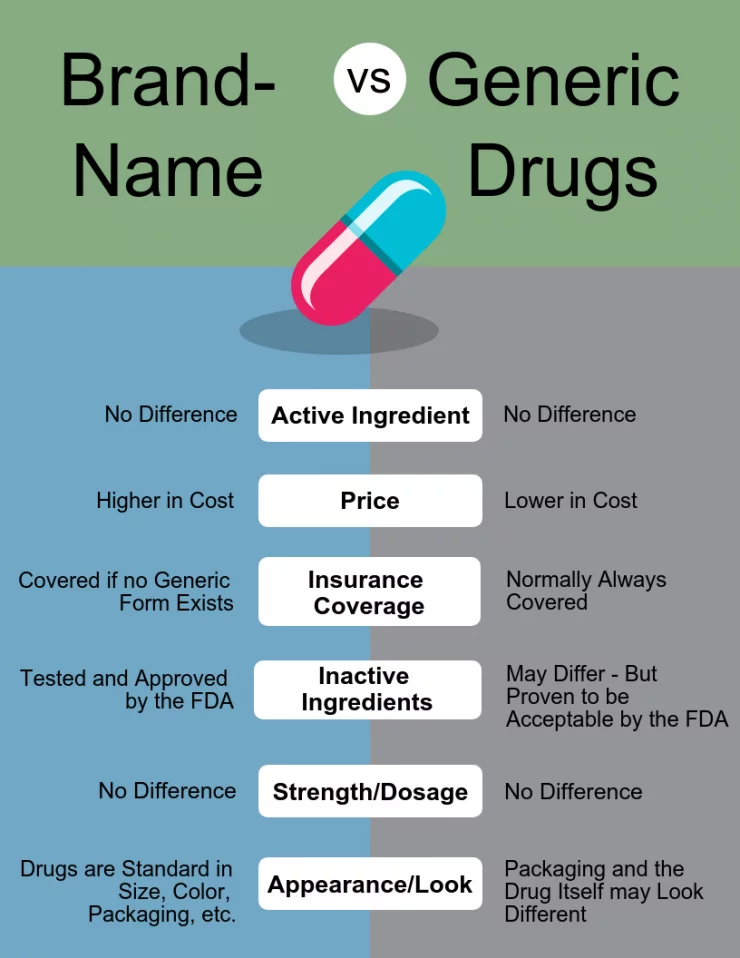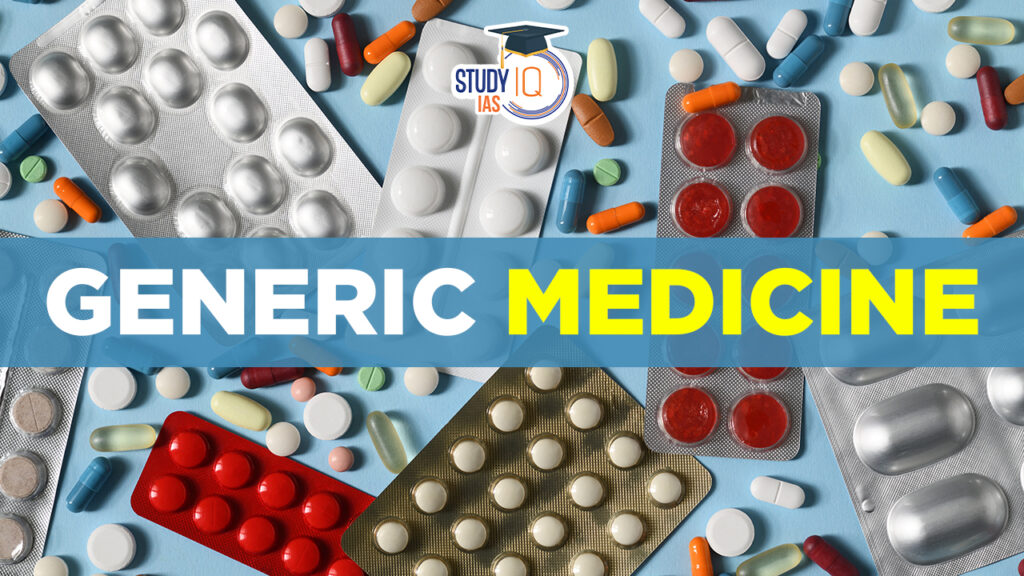
The terms “generic medicine” and “branded medicine” are frequently used in the pharmaceutical industry. Knowing the distinction between these two as a consumer can greatly influence your healthcare choices, particularly when taking treatment efficacy and cost into account. Although the same medical diseases are intended to be treated by both branded and generic medications, there are a few key distinctions between them.
In order to help you make an informed choice regarding your treatment options, this guide compares many characteristics of generic versus branded medications, including cost, effectiveness, safety, and regulation.
Branded Medicine: What Is It?
Branded medications are those that a pharmaceutical corporation develops, markets, and sells under a particular trademarked name. A drug’s safety and effectiveness are demonstrated through clinical trials and a rigorous research and development procedure. Following approval, the maker receives a patent, which for a set amount of time—typically 20 years—prevents other businesses from making or marketing the identical medication.
Because of the expenses involved in research, development, clinical testing, marketing, and distribution, the branded medication has a higher price tag. Branded medications include things like Advair, Tylenol, and Viagra. These goods are identified by their unique names, logos, and packaging and are frequently promoted through well-known advertising campaigns.

Generic Medicine: What Is It?
In essence, generic medications are exact replicas of name-brand medications. Other pharmaceutical companies are able to produce and market generic versions of a medicine once its patent expires. The primary distinction between generic and branded medications is that the former are offered at a much reduced price and are marketed under their chemical name or another brand name.
Generic medications are produced to be bioequivalent to the original product and contain the same active components as the branded medication. This indicates that the generic medication functions similarly to the brand-name one and has the same therapeutic advantages. After proving they adhere to stringent safety, quality, and performance standards, generics are authorized by regulatory agencies such as the FDA or EMA after demonstrating that they meet strict guidelines on safety, quality, and performance.

Important Distinctions Between Branded and Generic Medicine
- The price of brand-name versus generic medicine
The cost is one of the biggest distinctions between branded and generic medicine. Because the company must recoup the expenses of the R&D process, clinical trials, and marketing, branded medications are usually far more costly. Generic medications, however, are far less costly. Generic medications are frequently 30% to 80% less expensive than branded ones since they don’t need to invest as much in marketing, clinical studies, or research. For instance, the generic form of atorvastatin may cost as little as $20 to $30, whereas a branded medication such as Lipitor may cost as much as $100. - Generic vs. Branded Medicine Effectiveness
Consumers frequently wonder if generic medications are just as effective as name-brand ones. However, generic medications must be bioequivalent to their branded equivalents in order to pass regulatory bodies like the FDA and EMA. This implies that generic medications must enter the bloodstream with the same quantity of active substance, at the same rate, and for the same amount of time as branded medications. The therapeutic action of generic medications is unaffected by minor variations in inactive substances, such as coloring agents, binders, or fillers. - Regulation and Safety of Branded vs. Generic Drugs
Health agencies like the FDA in the United States and the EMA in Europe strictly monitor both branded and generic medications. The manufacturer of a generic medication must provide evidence that the medication is safe and effective by demonstrating that it is bioequivalent to the branded version in order for it to be approved. Since branded medications must pass stringent clinical trials and research to determine their safety and effectiveness, the approval procedure is more involved. To guarantee that they fulfill strict safety and quality requirements, generic medications are subject to the same regulatory requirements once the patent expires and they are put on the market. - How Generic and Branded Medicines Are Packaged and Look
Packaging and appearance are two obvious ways that generic and branded medications differ from one another. To set themselves apart from competing goods on the market, branded medications frequently feature distinctive packaging, colors, logos, and other visual indicators. However, the appearance of generic medications may differ from that of their branded equivalents. This is because it is illegal for generic drug producers to imitate the original product’s branding. The generic drug may differ from the branded version in terms of color, shape, or markings, but the active components and efficacy are the same. - Patent protection and market exclusivity
The function of patents is another essential distinction between branded and generic medications. Patents safeguard branded medications, granting the maker the only right to market the product for a predetermined period of time (usually 20 years). No other business is able to manufacture the same medication during this time. Manufacturers of generic drugs are free to release their own versions of the drug onto the market after the patent expires. Patients can now afford the drug because of increased competition, which lowers pricing. For instance, generic versions of Prozac, which were significantly less expensive, flooded the market once the drug’s patent expired. - How Do Consumers View Branded vs. Generic Medicine?
Many people are still reluctant to pick generic medications over branded ones, even though they are subject to stringent testing and regulatory requirements. This is mostly because of perception and brand loyalty. Branded goods are frequently thought of as being of superior quality, however this isn’t always the case with pharmaceuticals. Since generic medications provide the same therapeutic effects at a significantly cheaper cost, medical experts typically recommend them. However, due in large part to the brand marketing that goes along with branded medications, the idea that generics are “less effective” still exist.
Benefits and Drawbacks of Branded and Generic Medicine
Benefits of Generic Medicine
Cost-Effectiveness: Patients can afford generic medications because they are often 30% to 80% less expensive than branded ones.
Same Effectiveness: With the same active components, generic medications are equally as effective as branded ones.
Greater Accessibility: A larger populace can now afford necessary therapies because to generic medications’ reduced costs.
The drawbacks of generic medications
Distinct Appearance: Patients may become confused or hesitant about generic medications because they frequently look different from branded ones.
Limited Brand awareness: Because generics lack trust and brand awareness, some patients may feel less confidence using them.
Benefits of Branded Drugs
Brand Trust: Because of the standing of the pharmaceutical firm that makes them, patients frequently have greater faith in branded medications.
Proven History: Because branded medications have been used for a longer period of time, they may appear more dependable.
The higher cost of branded medications is a drawback because of the expenses associated with marketing, R&D, and patent protection.
Restricted Access Post-Patent Expiration: Generics compete with the drug after a patent expires, which frequently results in a smaller market share.

Conclusion: Choosing Between Generic and Branded Medicine
In conclusion, the difference between generic medicine and branded medicine comes down to cost, branding, and market exclusivity. While branded medicines offer the benefit of a well-established reputation, generic medicines provide the same effectiveness at a fraction of the price. Both types of medicines undergo rigorous testing and regulation to ensure their safety and efficacy.
For most patients, generic medicines are a cost-effective, equally reliable alternative to branded medicines, without compromising on quality or therapeutic benefits. However, it’s essential to consult your healthcare provider to determine which option best suits your needs and preferences.
Making an informed choice between generic and branded medicines can help you manage your healthcare costs effectively while ensuring that you receive the best possible treatment.